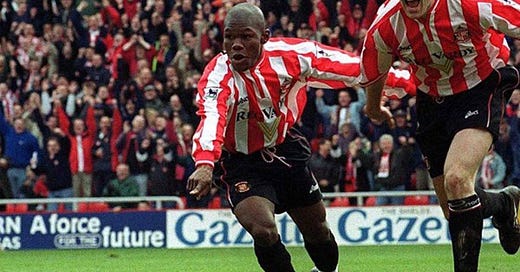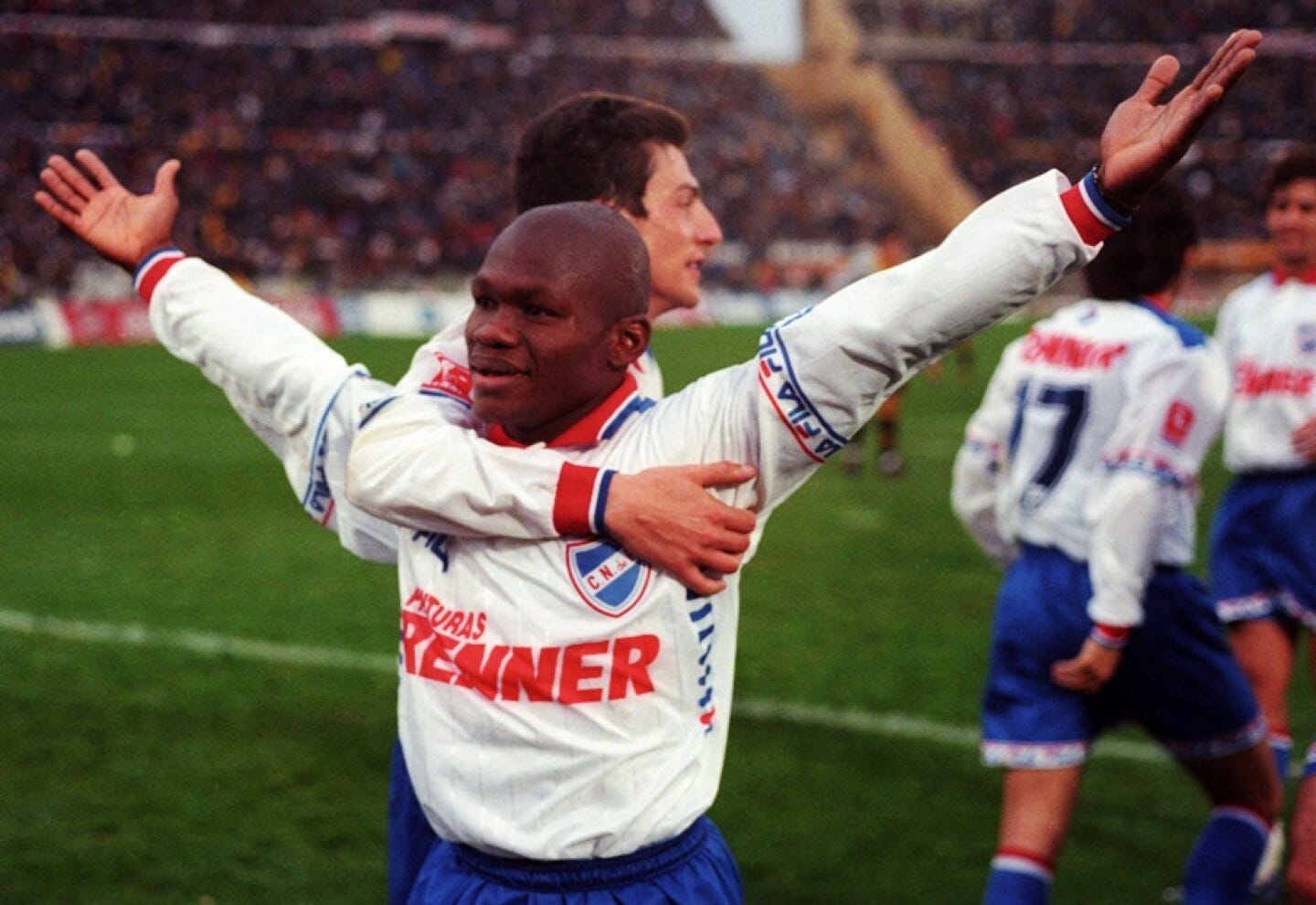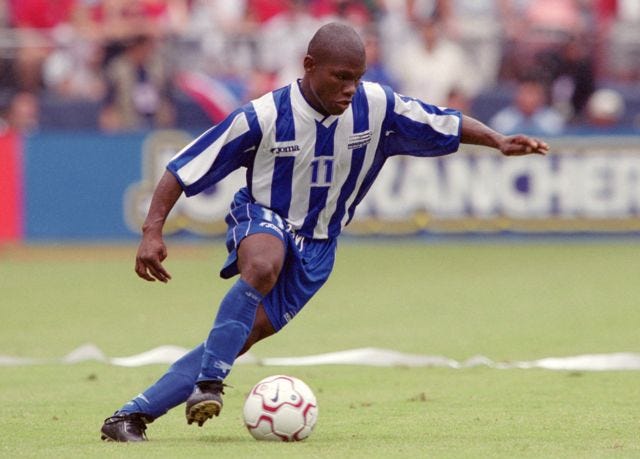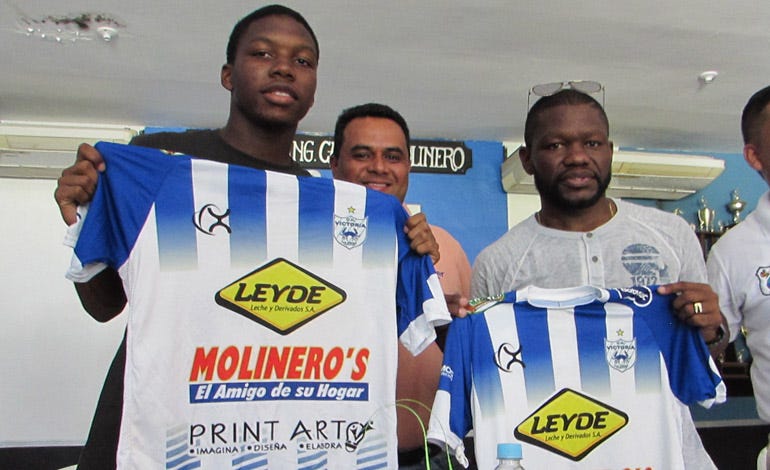Perseverancia - The Tyson Nuñez Story
A look into a Premier League career that was never allowed to begin
With the 2023 Premier League season underway, I wanted to revisit one of the most interesting Concacaf/Premier League stories you will find. There have been several Honduran players to play in the English Premier League. You may know Maynor Figueroa, Roger Espinoza, or Wilson Palacios, but before any of those players made their names in England, there was Milton “Tyson” Nuñez…sort of. Across two seasons at Sunderland, Tyson played in just 2 games. So what happened? What went wrong for him during his stop in the Premier League? It’s a story you’ll just have to read to believe.
Background
Milton Nuñez grew up in a small town just outside of La Ceiba (an epicenter of futbol talent, Garifuna culture, and some of the best sopa de caracol you can find). He was given the nickname “Tyson” by a teammate because of his apparent resemblance to the boxer (a nickname he initially disliked but came around on). Standing at just 5ft 4in, the deck was stacked against him making it as a footballer.
He made his professional debut with Deportes Progreseño at age 18 in the Honduran league. After a few seasons with Real España in Honduras, he moved to Guatemalan giant Comunicaciones - where he helped them win a league title. These performances earned him a transfer to Uruguay to play for Nacional (one of the best teams in the country).
Tyson became a fan favorite at Nacional for his innate goalscoring ability (including 3 goals in the 1998 Copa Libertadores), acrobatic finishes, and entertaining goal celebrations. He would later remember these as his greatest footballing moments (highlights here). He leveraged that time into a loan move to Europe joining PAOK in 1999. During these years, he also became a regular with the Honduran national team and had amassed 14 goals including a goal against Colombia in the 2000 Concacaf Gold Cup. At 27 years old, he was playing some of his best futbol for both club and country - there was nowhere to go but up!
Welcome to Sunderland
Fast forward to March 2000 and the European transfer deadline. The news broke - Sunderland had acquired Tyson for 2.6 million euros. At the time, manager Peter Reid said: “He has something I thought we were missing, that bit of extra pace up front, and I`m looking forward to seeing what he can do for us.” Shortly after, he was unveiled to the Sunderland supporters at half-time of a game against Everton where he shadow-boxed during a lap around the field, further leaning into his nickname. More than 25,000 fans showed up to a reserve team game against Manchester United to see his club debut where he nearly scored.
In the following days, Tyson would make his Premier League debut against Wimbledon as a sub in the 75th minute. In an interview with Timothy Abraham in the Northern Echo, Tyson recalls the day: “I was the first Honduran to play in Premiership – it was a very proud moment for me.” It was a huge moment for him and for the nation. Abraham recalls the takeaways from the fans though - Tyson wearing a jersey far too large for him and their surprise at his soaring through the air for a header.
He later came on as a late sub in a cup game against Luton Town and that would prove to be the last time he played in a competitive match for Sunderland. The next year, his contract was terminated - just over 400 days into a 4-year contract.
What went wrong?
What happened? How does a player that was purchased for close to 3 million euros (not a small fee at that time) only see the pitch twice and never play again? The answer is not so straight-forward and it was a combination of many unfortunate situations outside of Tyson’s control.
Sunderland may never have intended to sign him
The notion that Sunderland accidently signed the wrong player has always been a popular theory - and this was something that Tyson himself denied as a possibility for years. According to The Roker Report, some say that the Sunderland manager, Peter Reid watched too many grainy videos of PAOK. Other said that he may have had a little too much to drink while scouting in Greece and got Tyson mixed up with somebody else.
Just a few years ago, Tyson added some clarity. He was not the original player that Sunderland had targeted during the transfer window. Apparently, they were targeting his PAOK teammate Adolfo “El Tren” Valencia but ended up seeing footage of Tyson’s compatriot Eduardo Bennett and got everything mixed up. Despite the confusion, Tyson said they did indeed see his footage and were interested in him - even if he wasn’t their initial target. He explained that Valencia was over 6ft and played a very different style than him so it would be impossible to confuse them.
We may never know exactly what happened, but it is plausible that he ended up there by mistake given that Sunderland was reported to have filed a lawsuit over the matter. If that was the case, it is reasonable to think that Reid would have iced out Tyson over the whole issue.
Being undersized compared to other Sunderland strikers
In the late 90s and early 2000s, it was very rare to see players as small as Tyson in the Premier League (especially playing striker.) Upon his arrival, one teammate said “we were waiting for Tyson! The real Mike Tyson. But you are tiny".” Nuñez just laughed it off, but the concerns about his size weren’t just jokes from the fans or teammates but also from manager Peter Reid. Tyson says that Reid would remind him that the Premiership was full of strong and big players and that frustrated him.
Sunderland’s main striker Niall Quinn was 6ft 4in and their secondary striker Kevin Phillips was much shorter a 5ft 7in but played very strong and direct. The other strikers on the roster at that time (Danny Dichio and Don Hutchison) were both over 6ft as well. Tyson’s style was not a fit for the gameplan that the manager had. According to Timothy Abraham “his was a game based around guile and inventiveness perhaps not suited to the up-and-at-em style Reid had engendered. Motivation rather than sophistication was Reid’s mantra.”
Playing with the Honduran national team
There were documented disagreements between Tyson and Reid related to Honduran international duty. It seems as though Reid was not in favor of some of the time that he missed during his matches with Los Catrachos. There was a Sunderland game where Tyson was expected to start alongside Kevin Phillips, but he never got into the game - much to the surprise of his teammates. He thinks there may have been consequences for playing frequently with the national team - but he was dedicated to La Selección and never said no to the opportunity to represent his country.
Discrimination
The terrible reality of racism and discrimination that is widespread in our world, and the sport of football, is something Tyson Nuñez was all too familiar with during his playing career. He experienced it in his home country of Honduras and also during his time in Guatemala. During his short time in England, Tyson had to deal with this both systemically and personally.
According to Timothy Abraham, “Nuñez became the only black player in Sunderland’s first-team and up to that point they were the only side in the English top-flight without a black or mixed race player in their senior squad.” This was something that carried a lot of weight with it and he played in England at a time when the consequences for racist behavior from fans and other players were less severe than they are today.
During his time at the club, the question of whether he was not playing because of his skin color was raised. An interview from a local outlet in Honduras quoted Tyson saying: “It seems unusual to me that several coloured players have come to train with the club, but none of these have been chosen. If I found out he (Peter Reid) does not consider me due to the colour of my skin I would want to leave.” When asked if he thought manager, Peter Reid, was a racist, he responded: "I would say not. I don't want to think that."
According to the club, upon his return to England, he met with Peter Reid and the club spokeswoman stated: “Milton was upset by the article and has been quick to assure us that these are not his views. The issue of racism was raised by the interviewer. Milton says he dismissed this suggestion immediately and certainly does not believe this is the case and is unhappy that he has been linked to these statements." This was an official statement from the club and not from Tyson directly - so take that for what it’s worth.
After his time in England, and perhaps in a position to speak more openly, Tyson has been asked about the topic of discrimination several times and has stated the following:
On whether his skin color held him back at Sunderland, “Some people say there was an issue with racism at that time, I never ever suffered anything directly. Institutionally? Maybe (there is) some truth in that. I don’t know. People can say that me saying that is true, or they can say it is lies. It does not change my view of Sunderland, though. I loved my time there with the fans, coaches, and team-mates even though I hardly played a game.” (source)
On manager Peter Reid, “What they do not mention is that the coach I had in that team was a racist, I had very little communication with him, as he was bothered by me going to the national team and I didn’t see an opportunity to play with the team. I was always on the bench waiting to play.” (source)
On discrimination experienced at Sunderland, “they referred to me as a drug addict from Central America, and because of that, I won a lawsuit. And that lawsuit led to a foundation. In the end, many things happened that were negative” (source)
If Tyson was indeed robbed of a chance at a career with Sunderland due to discrimination based on his ethnicity and nationality, this is a tragedy. And this type of prejudice is unfortunately all-to-common on and off the pitch.
What could have been?
When I consider all these obstacles, I can’t help but think about what could have happened had he been given a fair chance to succeed at Sunderland. Let’s be clear, this is not an Ali Dia story (a player with no professional experience who hoaxed his way into the Premier League). Tyson Nuñez gets unfairly lumped into the Ali Dia camp by many fans and pundits from England and is listed on the 50 worst Premier League transfers alongside of Dia. The fact is, Dia was not a professional footballer...Tyson was a proven goal scorer but he was never given a fair shot in the Premiership.
There are many pieces of evidence that show that Sunderland probably missed out. One was a World Cup qualifier Honduras had against the USA just weeks after Tyson’s contract was terminated. The Concacaf Hexagonal was tightly contested and both teams would have benefited from a win. The game was on US soil, so the Catrachos were not favored to win. In one of the all-time great matches for Honduras, Tyson scored two fantastic goals to lead Honduras to a 3-2 win against a team that would later make it to the quarterfinals at the 2002 World Cup. The US wouldn’t lose another World Cup qualifier at home for 15 years!
Tyson was in incredible form for the national team from 1999-2001 despite getting close to zero competitive minutes at Sunderland. He found the back of the net 8 times during 2002 World Cup qualification - unfortunately he and Honduras’ golden generation missed out on the World Cup that year (a story for another time). I can’t help but think his appearance as a key piece of the Honduran attack at a World Cup would have given him the platform to show Sunderland and other Premier League teams that they missed out on a special player.
Sure, there have been players that excelled for their national teams that never make an impact in the most elite leagues in the world. I think what makes this so frustrating for Honduran fans is that Tyson made it all the way to the Premiership and had the all the intangibles, but the door still wasn’t opened. Despite the lack of competitive appearances, other Premier League teams did take notice to his talents. He was given a trial with Aston Villa and there were rumors circulating that Manchester City were interested in signing him after his contract was terminated.
Prior to his move to England, if anyone watched Tyson play, they could see he was special. Despite his diminutive frame, he found a way to score goals as a forward. One lifelong Honduran fan I spoke to said he was simply a natural goal scorer. He had a very high soccer IQ - he was almost always in a great position to score and would make darting runs behind opposing back lines before they could have a chance to catch up. Some of the words used by other fans to describe his game were “matador” and “game changer”.
He had a second gear of breakaway speed that even the best defenders had trouble keeping up with. He was acrobatic in the box and had a knack for scoring chilenas, volleys, and scissor-kicks. Tyson explains that he grew up perfecting these moves in the ocean while practicing with the waves. He could score just as easily with both feet which made him extremely difficult to defend. If you have never seen any of his highlights, check out this video of some of his best goals below (if you look at the dates on some of these you’ll see that he was scoring these types of goals well into his 40s!)
Could Tyson Nuñez have been a great Premier League player? It really is impossible to know. If given the right opportunity, I think he could have had a several year stint in the league as a spark off the bench. As previously discussed, it was extremely rare to see players as small as him at that time…especially as forwards. It is unlikely we would have been a regular starter - but I am sure with his skills and abilities he could have found his place in a rotation with several teams.
What happened to Tyson Nuñez?
It’s easy to read through all of this and feel sorry for Tyson, but he has spoken at length about that time in England not being a waste and in a recent Facebook post, he included this quote with a photo of him in his Sunderland kit: “My experience in English football was not very pleasant, with God's help we got through those difficult times, nothing is impossible, don't give up.”
He also went on to have a long career in the beautiful game - one of the longest I have ever heard of actually. After his contract was terminated with Sunderland, Tyson returned Nacional in Uruguay were he had previous success. After a year there and a brief stop with his other former team (Comunicaciones), he played a few years in Liga MX with Pachuca and Necaxa. In the years following his time in Mexico, Tyson bounced around the largest teams in the Honduran Liga Nacional: Marathón, Olimpia, and España, winning trophies at each stop.
During this time, he continued to play and score regularly with the Honduran national team. His final cap came in 2008 and in his career, he appeared in 86 matches scoring 34 goals - enough for 3rd all-time for Los Catrachos ahead of legends like Carlo Costly, David Suazo, and Amado Guevara. In 2009 (at the age of 36) Tyson went back to Guatemala and played well into his 40s and as you can see in some of the previous highlights, still scored incredible goals.
In 2019, at age 46, he made history signing with second division side Victoria (a team from La Ceiba - just outside his hometown) to play alongside his son and to help the team climb back to the first division. He made an impact on the field (scoring multiple goals and adding several assists). Promotion wouldn’t come for Victoria for a few more campaigns, but the impact Tyson made in bringing attention and momentum back to the club was invaluable. In 2020, he officially retired from the sport.
Beyond the impact that Tyson made on the pitch during his career, he has done so much work to better the game in Honduras and around the globe. He started Fundación Tyson Nuñez in 2019 to provide sporting and education opportunities to children in the Garifuna communities where he grew up. He has also been active in fighting against racism and discrimination in the sport around Central America. Throughout his career, he maintained a positive outlook despite many obstacles being thrown his way. In speaking on his 28-year career, Tyson said:
“Obviously it has been something very beautiful, God has blessed me with this career, and that is how I want to make it clear to young people that it is not with the passport that they play, but with talent” (source)
His story and his legacy are an inspiration to young players from Honduras and all across the Concacaf region - do not let the lack of opportunities or access based on where you are from hold you back. Despite not making an impact at the most elite levels of club futbol, Tyson Nuñez is a legend of the game in his country and the region on and off the pitch. While it is easy to wonder what could have been in the Premier League, he created his own legacy that won’t soon be forgotten!
For a great overview on Tyson Nuñez’ career, check out this feature piece from El Toque de Rely:










Well written article. Somebody did their research.